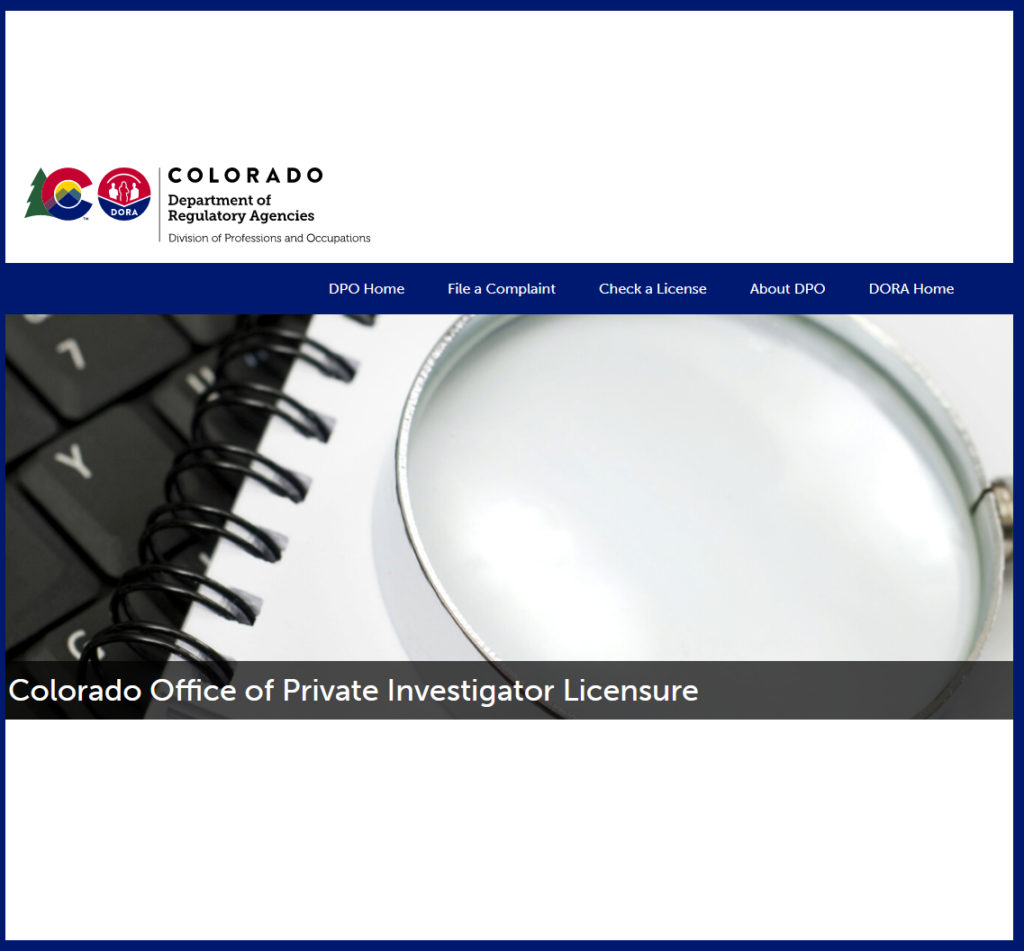
With Governor Jared Polis recently being re-elected by a wide margin, it doesn’t seem likely that state licensing for private investigators will be re-instated any time in the next five years. The requirement was dropped in Colorado as of 1/14/22 when Polis vetoed House Bill 20-1207 in July 2020. The bill called for the continued regulation of private investigators by the state until 2025.
In his veto letter, Polis cited the 2019 Colorado Office of Policy Research and Regulatory Reform (COPRRR) sunset review of the program. The office completed reviews for regulation in 1985, 1987, 2000 and 2006, according to the letter. Each of those times they concluded that regulation is not necessary, Polis said. In 2011, the department reported “through yet another sunrise review” that private investigators should be minimally regulated to ensure they have “either a surety bond or E&O insurance and passage of a jurisprudence examination.”
A History of PI Licensure in Colorado
Until 2015, Colorado was only one of a few states without mandatory private investigator licensing, according to Pursuit Magazine. Colorado did have a long history of legislation surrounding investigations, according to PInow.com, citing references to investigations found in the 1877 Legislative Manual of the State of Colorado. But in 1977, the Colorado Supreme Court determined there wasn’t a clear definition of a “detective business” as it relates to private investigation.
The Colorado legislature eventually passed the Private Investigators Voluntary Licensure Act in 2011, which defined what a private investigator was and outlined voluntary licensure. The law went into effect in 2012. Polis said in his veto letter that the General Assembly took “the extraordinary step” to expand regulation for PIs to mandatory licensure in 2014. This was, in part, due to efforts by the Professional Private Investigator’s Association of Colorado, according to the Pursuit Magazine op-ed. That law went into effect 2015, but it included the sunset clause to review.
Reasons and Effects of the Veto
Polis said that COPRRR’s 2019 scheduled sunset review determined that regulation should not continue. He says that since the mandatory licensing began in 2015, “there have been 77 complaints resulting in only eight disciplinary actions taken against licensees.” In the veto letter, he said occupational licensing is too often used “to protect existing professionals within an occupation against competition from newcomers” and that “eliminating unnecessary credentialing broadens diversity and allows more to offer and access various services,” as one of the reasons for the veto. “This is especially true for PIs, as licensure does not require any continuing education or real test of competency,” he said, adding that he hopes the sunsetting of the regulation will “allow more people to enter the occupation and to access these services.”
He adds in the letter that there is some potential for consumer harm resulting from rare instances of deceptive trade practices, that they maybe be addressed through other areas of law and that he is willing to work with the General Assembly to create legislation that would require a background check and potentially retain some level of insurance or bond. It remains unseen as to how much of a priority this is for the legislature or his administration.
Information about those private investigators who had already been licensed with the state of Colorado before the veto is still available at the Division of Professions and Occupations (DPO) on Colorado’s Department of Regulatory Agency’s website or via open records requests. “Previous public discipline is never purged,” said DORA spokesperson Lee Rasizer, in response to an inquiry. However, the DPO no longer has private investigators under its regulatory authority and has no jurisdiction to investigate new complaints.
So, what does the lack of state licensing for private investigators mean to that profession and its clients and consumers? Is a state license critical to ensuring ethical investigations? What are best practices for those considering hiring a private investigator in Colorado beyond using an established and reputable firm such as Ross Investigators and how much will the lack of state licensure matter going forward? Please share your thoughts by commenting below.
-
Elon Musk used private eyes to silence critics
He’s the world’s richest man with a fortune valued at $262 billion. An outspoken Trump supporter, Elon Musk runs SpaceX, Tesla and Starlink. And as the owner of X, formerly known as Twitter, he styled himself as a free speech absolutist. But an investigation by Tortoise – an online news site — finds that while…
-
Use of facial recognition software raises eyebrows
Digital tools and spy gadgets like open-source intelligence, AI and surveillance equipment have been a game changer for investigators worldwide. But one new technology– facial recognition software – is raising eyebrows, with some states including Colorado seeking to regulate the technology. That’s because civil rights groups and defense lawyers have concerns about privacy, perceived racial…
-
Should peace officer database be public?
As a unit within the Colorado Attorney General’s Office, the Colorado Peace Officer and Training (POST) board documents and managers the certification of all active peace officer and reserve peace officers working across the state. It also maintains a database on peace officers related to disciplinary action including “untruthfulness”, “revocation of POST certification”, “termination for…
Leave a Reply